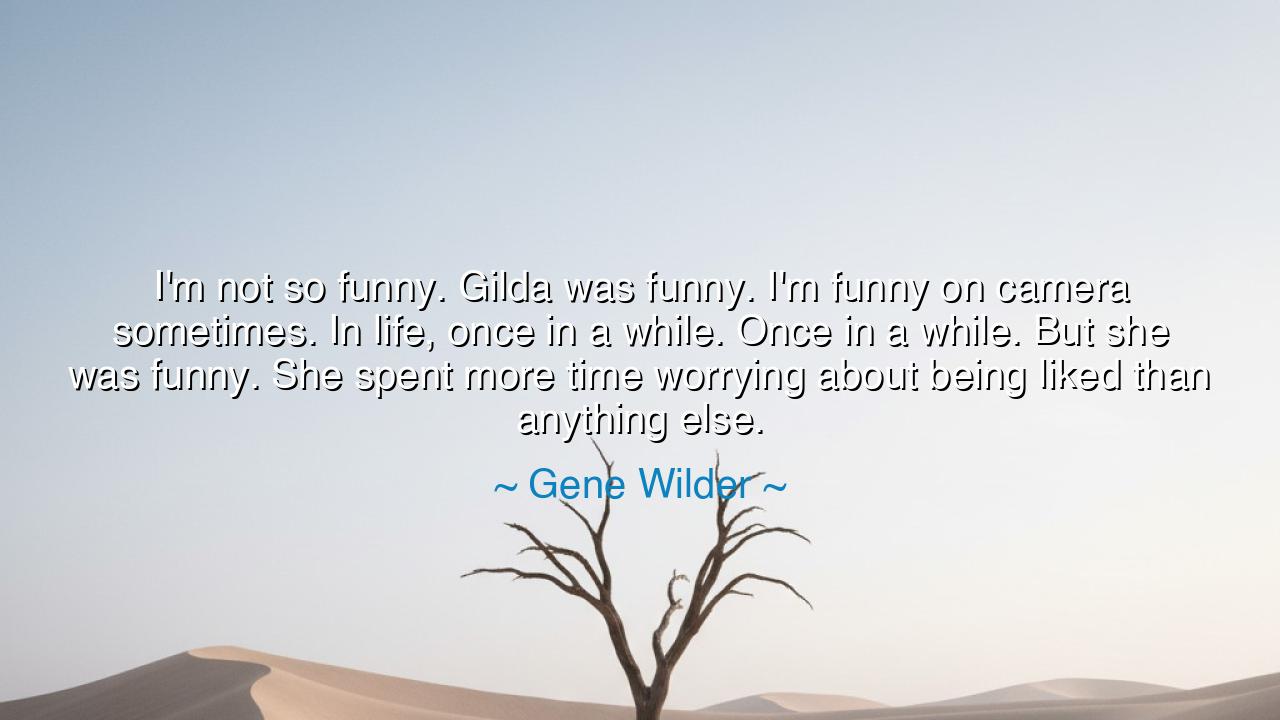
I'm not so funny. Gilda was funny. I'm funny on camera sometimes.
I'm not so funny. Gilda was funny. I'm funny on camera sometimes. In life, once in a while. Once in a while. But she was funny. She spent more time worrying about being liked than anything else.






In the tender and reflective words of Gene Wilder, “I’m not so funny. Gilda was funny. I’m funny on camera sometimes. In life, once in a while. Once in a while. But she was funny. She spent more time worrying about being liked than anything else,” there breathes a quiet hymn to love, humility, and the fleeting nature of laughter itself. It is not the boast of a man seeking glory, but the confession of one who has seen the truth of what it means to be human — that genuine humor is born not from ego, but from heart, and that even the brightest souls, like Gilda Radner, often wrestle beneath their light with the longing simply to be loved.
To understand these words, one must know the bond between Gene and Gilda — two souls intertwined by art and affection. He, the gentle craftsman of comedy, whose wit lived in restraint; she, the wild and luminous spirit of laughter, whose joy seemed endless but whose heart carried its own storms. When Wilder speaks of Gilda being funny, he speaks not only of her talent, but of her essence — her natural ability to make the world lighter, even as her own burdens weighed heavily. In his humility, he places her above himself, as though her laughter was something divine, and his own but an echo. Yet beneath that modesty, there is reverence — a deep understanding that true humor, the kind that endures, springs from love, vulnerability, and truth.
The ancients might have called Gilda a vessel of divine mirth, one of those rare beings through whom the gods allowed joy to pass into the mortal realm. Her laughter, like that of the mythical Thalia, the Muse of Comedy, was both blessing and burden. For those who bring joy to others often do so at the cost of their own peace. And Gene, ever the observer of the soul, recognized this paradox. He saw that behind her brightness, Gilda longed to be liked, accepted, seen. Her laughter, perhaps, was a bridge toward belonging. And when he said she “spent more time worrying about being liked than anything else,” it was not judgment — it was compassion. For who among us has not sought affection in the eyes of others, mistaking it for the peace that only self-acceptance can bring?
In his words, there is also a reflection on the nature of performance and truth. Wilder knew that the laughter of the stage is different from the laughter of life. “I’m funny on camera sometimes,” he admits, as if to say that art allows him to access a magic not always present in daily existence. It is as though the screen becomes a temple where emotion and imagination meet — but beyond that, in the quiet corridors of life, humor becomes rarer, softer, tinged with melancholy. The ancients might have said that the artist’s gift is a double-edged sword: to make others laugh while privately seeking meaning in the silence after applause.
This duality recalls the story of Democritus, known as “the laughing philosopher.” He laughed at the follies of mankind not out of cruelty, but out of wisdom — for he saw that to survive the absurdity of existence, one must find laughter in its tragedy. Gilda, in her mortal way, did the same. Her humor was her shield and her offering. Gene’s reflection captures this sacred exchange: the laughter that heals others, yet often hides one’s own ache. In that sense, his quote is less about comedy and more about compassion — a meditation on how the funniest hearts often break the easiest, and how love itself is the truest performance of all.
There is humility too in Gene’s self-assessment. “I’m not so funny,” he says — not because he doubts his gift, but because he recognizes that humor is not a competition. It is an art of giving, a shared fire that burns brighter in another’s presence. In honoring Gilda, he reveals a profound truth: that love sees greatness more clearly in others than in itself. His words remind us that the highest form of admiration is not flattery, but recognition — to see another’s light and rejoice in it.
So, what then is the lesson this reflection bestows upon us? It is this: that laughter is sacred, but love is greater still. Be humble in your gifts, and generous in your praise. When you encounter souls who make the world brighter — cherish them, for such souls are rare. And if you, like Gilda, find yourself seeking to be liked, remember that your worth lies not in the laughter you provoke, but in the truth you live. Let your humor, your art, your kindness, come from the heart — not to earn affection, but to give light.
Thus, Gene Wilder’s words endure as a gentle psalm to love, humility, and the bittersweet beauty of being human. He teaches us that behind every laugh there may be longing, and behind every performance, a fragile heart. Yet even so, we must continue — to create, to laugh, to love. For in the end, it is not about being the funniest or the most admired; it is about being real, being kind, and recognizing the divine spark of joy in another — and bowing, softly, in gratitude.






AAdministratorAdministrator
Welcome, honored guests. Please leave a comment, we will respond soon